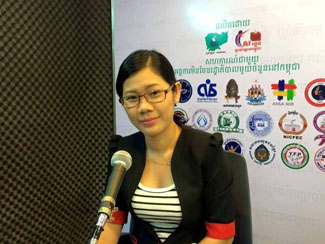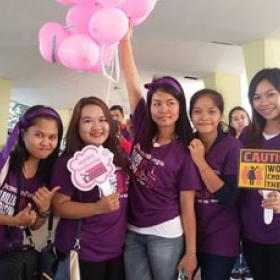



Like many women of my generation, when I was younger, I never asked myself why women and girls live under the control of men. Or why women have less value than men in all aspects of our daily lives or even in the political sphere. Women were not encouraged to participate in politics; we kept our silence because everyone believed that politics was only for men. I just dutifully followed Khmer’s traditional “Chab Srey”, a moral code for Cambodian women that reinforces gender stereotypes and inequalities. This is still being taught in school to this day.
My friend Noy Chhorvin, who, like me, is a member of the JASS-inspired youth alliance Cambodian Young Women’s Empowerment Network (CYWEN), sums up what we Cambodian women were taught at home: “My family told me that to be considered a good girl, one has to do domestic work, get married and have children, stay at home to take care of her family, listen to the advice of male family members, keep her ideas to herself, and stay beautiful”.
I do believe that Cambodian culture and traditions are invisible powers that effectively influence everyone. If a woman speaks up against these traditions she will get negative reactions from her family, neighbors, friends, and peers. Almost everyone, especially women, is particularly concerned about their safety and security in Cambodia nowadays. Especially if they openly declare themselves as feminist activists after they learned about their human rights and women’s rights and start to claim these rights. The words ‘feminist’ and ‘activist’ are being made synonymous with just fighting with the government. But there is more to feminism and activism than just opposing the State.
If I follow all the customary laws and Khmer traditions, then I cannot be myself and live the life I want. With the knowledge that I gained from my earlier gender trainings at the women’s NGO Gender and Development for Cambodia, and from the spaces for feminist learning that JASS continuously provides, as well as in discussions we initiate in CYWEN, I now have enough tools for critical thinking. I begin to question the existing order of things. Like, why does domestic violence happen in almost every Cambodian family around me? Why do women survivors of violence continue to experience victim-blaming/shaming even after they have received ‘justice’ from the Cambodian courts? Oftentimes, I say to myself, I cannot live with this injustice!
On paper, Cambodian law states that men and women enjoy equal rights. But the situation is far more different from reality. In particular, crimes such as sexual abuse, rape and domestic violence are seldom reported or investigated, and perpetrators often remain unpunished. Corruption and failure to enforce the laws, especially where violence against women is concerned, is a continuing concern in our justice system. The pursuit of truth is a big challenge and the people have lost confidence in Cambodia’s justice system.
Although Cambodia has ratified key international human rights treaties, such as the Convention on the Elimination of All Forms of Discrimination against Women (CEDAW), the Cambodian government still lacks the will in promoting and developing the legal framework necessary to support women in all sectors. Moreover, the government doesn’t create special measures that provide women who have suffered gender-based violence with critical support services.
What aggravates the problem of violence against women (VAW), apart from the victim-blaming and the lack of State support, is the culture of silence. Cambodian women are conditioned to be meek and not speak up when we see or experience injustice. It is not unusual that many women victims of VAW choose not to report for fear of being blamed, for fear of being disowned by their own families, for fear of exposing their experience for everyone to judge or misjudge.
Because of all of these, I have repeatedly asked myself the question: Why then, am I feminist activist? In my conversations with fellow feminist activists, I have found similar answers.
Sdeung Phearong, adviser to community youth group Joint of Youth Cambodia, recalls her beginnings as a feminist activist: “I didn’t consider myself a feminist activist when I was still staying in my hometown and even if I have formed a youth group where we have regular discussions about gender. But I just always felt that I disagree with our culture and Khmer traditions that didn’t give space, choice, and equal opportunity to women in education. In my village, there were only three young women in my generation who had access to education at a university in Phnom Penh.”
Phearong is, at this point, being pressured by her parents to marry. “A lot of girls in my community marry at a very young age. They follow the Khmer tradition of having an arranged marriage. My own parents are worried that I am still single; they wish to see me get married soon because they say I am way past the ‘marrying age’. They say it is now very hard to find a good husband. But I tell my parents that I would like to choose who and when to get married rather than be in an arranged marriage. I tell them, ‘I can do this if you support me’.”
CYWEN member Noy Chhorvin, who is also a staff of  the Open Institute (OI), credits her initiation to feminism to JASS: “I had no idea that I would become a feminist activist until I joined JASS’ training on feminist leadership – with Chan Kunthea, regional coordinator of JASS Southeast Asia as both facilitator and resource speaker. JASS gave me a space to understand feminism. I am now proud to call myself a feminist activist. Because of this, I face a lot of unconstructive reaction from my relatives and friends. My relative tells me that, ‘A good girl need not think about issues in society. She just needs to keep beautiful and find a rich husband. A woman who is highly-educated hardly gets married.’ It is a disheartening advice and unfortunately many women are still taught to believe this. But I keep myself strong and move forward”.
the Open Institute (OI), credits her initiation to feminism to JASS: “I had no idea that I would become a feminist activist until I joined JASS’ training on feminist leadership – with Chan Kunthea, regional coordinator of JASS Southeast Asia as both facilitator and resource speaker. JASS gave me a space to understand feminism. I am now proud to call myself a feminist activist. Because of this, I face a lot of unconstructive reaction from my relatives and friends. My relative tells me that, ‘A good girl need not think about issues in society. She just needs to keep beautiful and find a rich husband. A woman who is highly-educated hardly gets married.’ It is a disheartening advice and unfortunately many women are still taught to believe this. But I keep myself strong and move forward”.
Another CYWEN member, Sum Dany, who is also currently a communication officer of the Cambodian Water Supply Association (CWA), highlighted some of her views as a feminist activist: “My neighbors think that since I am feminist activist, I fight the government. They think I also play a role as an opposition party activist. Most of them think that I break good traditions and culture. All of my neighbors’ perceptions are not important to me; they do not have an effect on me. What matters to me most is my family’s support. My brother always tells me that even though I graduated from university, I will still be a wife, do housework, and stay at home to take care of my family and children after I get married. Even today, my family still doesn’t approve of my actions and my choices. My family thinks that gender issues are also political issues. They tell me, ‘It is for men who have high status to take on that role of involving in politics. If you are imprisoned, who can help you?’ But despite the discouragement, I still keep my own way”.
Land rights activist Kong Chantha rose above great challenges that she faced in her family life: “Previously, I didn’t think that I would become a land rights activist because back then, I didn’t think I faced any suffering. I became an activist after land grabbing began in Boeung Kak community in 2007. At that time, I faced both economic crisis and domestic violence at home. My husband did not agree with my frequent participation in protest rallies. He got angry every time I joined the demonstrations. He wanted me to run a small business at home so that I could take care of our children. Although there has been conflict in my family, I did not let my fellow women land rights activists, my team, down. They needed me and I also have a strong passion to help my community. I was arrested and imprisoned when I participated in a rally in 2014. But never, for one second, did I think that my action and my decisions were wrong. I would do it for everyone in my community who suffer from injustice”.
Standing up as a feminist activist in Cambodia is not easy. But with inspiring women like Chhorvin, Phearong, Dany, and Chantha – women who are not afraid to stand up for what they believe is right – it can be done. Together we rise in solidarity!